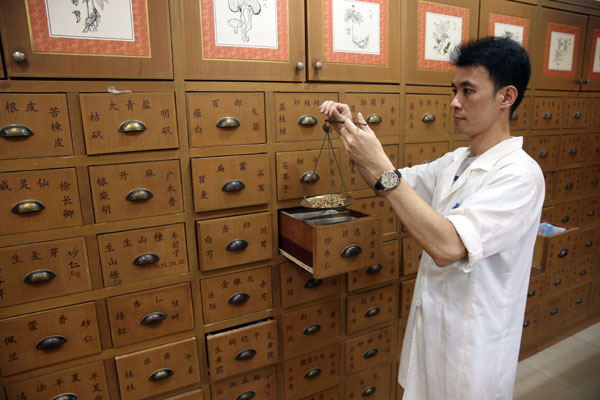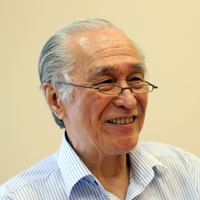In Kuala Lumpur's bustling Jalan Bukit Bintang shopping street, a sign hangs from a storefront bearing two curious slogans.
On one side, it reads, "Despite complicated procedures, no human effort is spared"; and on the other, "Despite classic quality, no material resource is saved."
The slogans belong to the Tongrentang company, a long-established producer of traditional Chinese medicine, with a thriving chain of pharmacies across China. Based in Beijing and founded in 1669, Tongrentang was a provider of medicines for the royal pharmacy during the Qing Dynasty (1644-1911).
The company set up business in Malaysia just 11 years ago and now has three pharmacies there. The shop in Jalan Bukit Bintang is its Kuala Lumpur branch.
Since its arrival in the country, Tongrentang has found Sino-Malaysian business partnerships an essential part of its survival. Hai-O Group, a local distributor that sells a wide range of Chinese herbal medicines, forged a joint venture company with Tongrentang in 2002.
Tan Kai Hee, group managing director of the Hai-O Group, said cooperation with Tongrentang has satisfied local demand for high-quality traditional Chinese medicines.
"We and Tongrentang share a large overlapping business area and are both leaders in the industry. In our partnership, Tongrentang provides medicine and doctors while Hai-O is in charge of administration, market expansion and daily operation of the stores," Tan said.
Tan, 76, is a household name in Chinese communities across Southeast Asia, famous for his early social activism and subsequent business success. In 1965, he was arrested by the Malaysian government for advocating left-wing activities and spent eight years in prison.
Hai-O, with an annual revenue of $80 million, was the fruit of his more recent business endeavors.
"Tongrentang can take full advantage of Hai-O's local resources - for example, more than 70 chain stores in Malaysia - to promote commercialization and marketing of their high-quality medicine," he said.
"Normally, there will be two or three experienced doctors of TCM sent by Tongrentang in residence at every store, and we also send staff to Beijing to learn from Tongrentang's exquisite medical practices," he said.
So far, Tongrentang has opened three branch stores in Malaysia: Kuala Lumpur, Penang and Petaling Jaya.
Wei Fukuan, a senior doctor with the Xuanwu TCM Hospital in Beijing, said TCM has an edge in tackling difficult miscellaneous diseases that Western medicine cannot diagnose.
Wei, with a specialty in digestive and urinary illnesses, has worked in Kuala Lumpur for five years.
"Tongrentang once had a patient who was also a councilor from Kelantan state. He lost the feeling in his legs after abdominal surgery, and Western medicine could not find the cause," he said.
Wei took his pulse, asked about his condition and felt that the temporary paralysis came from nerve injury caused by kidney damage during the surgery. He prescribed acupuncture, and other physical therapy, and symptoms were all gone within a year, he said.
Clash of cultures
However, communication between TCM doctors and local patients has been difficult at times, particularly where Chinese is not the patient's first language. In other cases, patients seem impatient with the TCM treatments they are given and stop applying them before they can take effect.
"The patients come to Tongrentang with the same expectations they have of Western-style doctors, and they do not cooperate with our treatments," Wei said. "Sometimes they stop halfway through, and previous efforts are wasted."
TCM is a well-established system of medical practice developed through thousands of years of empirical testing and the refinement of herbal mixtures. The accumulated clinical experience it represents is vast.
Yong Kian Yin, owner of a pharmacy in Kuala Lumpur, said Chinese medicine is not only popular among the Chinese community, but is also well-received by other ethnic groups, such as Malays and Indians.
Open for more than 30 years, Yong's shop sells a variety of Chinese medicines, including Tongrentang products and some others rarely seen in China. He said Angong Niuhuang Powder, a best-selling Tongrentang drug that helps clear away heat and toxic materials in the human body, is among the most popular medicines.
"More than a century ago, when our ancestors sailed across the oceans to settle down in Malaysia, they brought traditional Chinese medicines to save lives and better adapt to the harsh conditions. Later on, Malays and Indians gradually gained confidence in the reliable therapeutic effects of these medicines," Yong said.
"TCM's acceptance here means that Chinese culture is being promoted," he said.
Promoting TCM in the Muslim country can be difficult sometimes, Tan said, because the authorities, unaware of the medical science and philosophy of TCM, impose restrictions, such as withholding permits allowing medicines to be used in hospitals.
"In fact, the ingredients in some of Tongrentang's exports to Malaysia have been slightly adjusted in accordance with halal standards to fit into Malaysian society," Tan said.
According to the China Association of Traditional Chinese Medicine, the output of the TCM industry is expected to hit $88 billion by 2017, with an annual growth rate of 12 percent.












